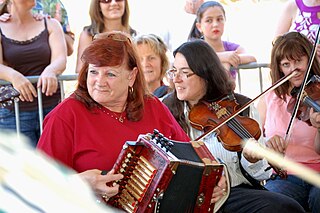
A concert is a live music performance in front of an audience. The performance may be carried by a single musician, sometimes then called a recital, or by a musical ensemble, such as an orchestra, choir, or band. Concerts are held in a wide variety and size of settings, from private houses and small nightclubs, dedicated concert halls, amphitheatres and parks, to large multipurpose buildings, such as arenas and stadiums. Indoor concerts held in the largest venues are sometimes called arena concerts or amphitheatre concerts. Informal names for a concert include show and gig.

BBC Radio 3 is a British national radio station owned and operated by the BBC. It replaced the BBC Third Programme in 1967 and broadcasts classical music and opera, with jazz, world music, drama, culture and the arts also featuring. The station has described itself as "the world's most significant commissioner of new music".

The Macedonian music refers to all forms of music associated with ethnic Macedonians. It shares similarities with the music of neighbouring Balkan countries, yet it remains overall distinctive in its rhythm and sound.

Symphony No. 40 in G minor, K. 550 was written by Wolfgang Amadeus Mozart in 1788. It is sometimes referred to as the "Great G minor symphony", to distinguish it from the "Little G minor symphony", No. 25. The two are the only extant minor key among Mozart's symphonies.

Applause is primarily a form of ovation or praise expressed by the act of clapping, or striking the palms of the hands together, in order to create noise. Audiences usually applaud after a performance, such as a musical concert, speech, or play, as a sign of enjoyment and approval.
In Western classical music, obbligato usually describes a musical line that is in some way indispensable in performance. Its opposite is the marking ad libitum. It can also be used, more specifically, to indicate that a passage of music was to be played exactly as written, or only by the specified instrument, without changes or omissions. The word is borrowed from Italian ; the spelling obligato is not acceptable in British English, but it is often used as an alternative spelling in the US. The word can stand on its own, in English, as a noun, or appear as a modifier in a noun phrase.

Kathleen Deanna Battle is an American operatic soprano known for her distinctive vocal range and tone. Born in Portsmouth, Ohio, Battle initially became known for her work within the concert repertoire through performances with major orchestras during the early and mid-1970s. She made her opera debut in 1975. Battle expanded her repertoire into lyric soprano and coloratura soprano roles during the 1980s and early 1990s, until her eventual dismissal from the Metropolitan Opera in 1994. She later has focused on recording and the concert stage. After a 22-year absence from the Met, Battle performed a concert of spirituals at the Metropolitan Opera House in November 2016, and again in May 2024.

A claque is an organized body of professional applauders in French theatres and opera houses. Members of a claque are called claqueurs.

A rehearsal is an activity in the performing arts that occurs as preparation for a performance in music, theatre, dance and related arts, such as opera, musical theatre and film production. It is undertaken as a form of practising, to ensure that all details of the subsequent performance are adequately prepared and coordinated. The term rehearsal typically refers to ensemble activities undertaken by a group of people. For example, when a musician is preparing a piano concerto in their music studio, this is called practising, but when they practice it with an orchestra, this is called a rehearsal. The music rehearsal takes place in a music rehearsal space.

A music venue is any location used for a concert or musical performance. Music venues range in size and location, from a small coffeehouse for folk music shows, an outdoor bandshell or bandstand or a concert hall to an indoor sports stadium. Typically, different types of venues host different genres of music. Opera houses, bandshells, and concert halls host classical music performances, whereas public houses ("pubs"), nightclubs, and discothèques offer music in contemporary genres, such as rock, dance, country, and pop.
The music of Baltimore, the largest city in Maryland, can be documented as far back as 1784, and the city has become a regional center for Western classical music and jazz. Early Baltimore was home to popular opera and musical theatre, and an important part of the music of Maryland, while the city also hosted several major music publishing firms until well into the 19th century, when Baltimore also saw the rise of native musical instrument manufacturing, specifically pianos and woodwind instruments. African American music existed in Baltimore during the colonial era, and the city was home to vibrant black musical life by the 1860s. Baltimore's African American heritage to the start of the 20th century included ragtime and gospel music. By the end of that century, Baltimore jazz had become a well-recognized scene among jazz fans, and produced a number of local performers to gain national reputations. The city was a major stop on the African American East Coast touring circuit, and it remains a popular regional draw for live performances. Baltimore has produced a wide range of modern rock, punk and metal bands and several indie labels catering to a variety of audiences.

An encore is an additional performance given by performers at the conclusion of a show or concert, usually in response to extended applause from the audience. They are regarded as the most complimentary kind of applause for performers. Multiple encores are not uncommon, and they initially originated spontaneously, when audiences continued to applaud and demand additional performance from the artists after they had left the stage. However, in modern times they are rarely spontaneous and are usually a pre-planned part of the show.
The Juneau Symphony is a semi-professional symphony orchestra located in Juneau, Alaska.

Rockbjörnen is a music prize in Sweden, divided into several categories, which is awarded annually by the newspaper Aftonbladet. The prize was first awarded in 1979, and is mostly centered on pop and rock.

A jazz club is a venue where the primary entertainment is the performance of live jazz music, although some jazz clubs primarily focus on the study and/or promotion of jazz-music. Jazz clubs are usually a type of nightclub or bar, which is licensed to sell alcoholic beverages. Jazz clubs were in large rooms in the eras of Orchestral jazz and big band jazz, when bands were large and often augmented by a string section. Large rooms were also more common in the Swing era, because at that time, jazz was popular as a dance music, so the dancers needed space to move. With the transition to 1940s-era styles like Bebop and later styles such as soul jazz, small combos of musicians such as quartets and trios were mostly used, and the music became more of a music to listen to, rather than a form of dance music. As a result, smaller clubs with small stages became practical.

A music session is a social gathering of musicians and singers who perform music in a relatively informal context. Much of the music performed at such events is traditional music for the area, popular songs and other well-known tunes. In sessions, the participants typically improvise the accompaniment, song arrangements and musical ornaments to the melodies of songs or tunes. The venue may be a public bar, tavern, village hall or a private home.

The Hanover Square Rooms or the Queen's Concert Rooms were assembly rooms established, principally for musical performances, on the corner of Hanover Square, London, England, by Sir John Gallini in partnership with Johann Christian Bach and Carl Friedrich Abel in 1774. For exactly one century this was the principal concert venue in London. The premises were demolished in 1900.

The Night Shift is the name given to a series of concerts run by the Orchestra of the Age of Enlightenment. As a Resident Orchestra at the Southbank Centre, the first Night Shift took place on 22 May 2006 at the Queen Elizabeth Hall. Since then there have been fifteen further concerts at venues including the Queen Elizabeth Hall, Royal Festival Hall, The Roundhouse and the Corn Exchange, Brighton Dome.
Redwood Symphony is an American orchestra based in Redwood City, California, in the San Francisco Bay Area. It is the Orchestra in Residence at Cañada College. Redwood Symphony is an all-volunteer orchestra dedicated to the creation of an alternative model of the symphony orchestra in the 21st century. To accomplish this goal, the orchestra concentrates on ambitious, contemporary repertoire, experiments with the concert format and adopts a more informal mode of dress than most other groups. Notable accomplishments are performances of all of the symphonies of Gustav Mahler and many world and local premieres.

A concert program or concert programme is a selection and ordering, or programming, of pieces to be performed at an occasion, or concert. Concert programs can be organized into a booklet. In some occasions the programs might be simpler, and will be put on a piece of paper. Programs may be influenced by the available ensemble of instruments, by performer ability or skill, by theme, by musical concerns, or by allowable time. For example, a brass ensemble may perform an "all brass" program, the pieces of which may be chosen by a theme, such as "all Bach", and the chosen pieces may be ordered so that they build in intensity as the concert progresses. Concert programs may be put together by ensembles, conductors, or ensemble directors, and are often explained in program notes. The structure of modern concert programs can be traced back to the contributions of Felix Mendelssohn while he was director of the Gewandhausorchester in Leipzig. Mendelssohn's programming style consists of an overture, a concerto or suite, an intermission, and then a larger work such as a symphony or operatic movement.



















